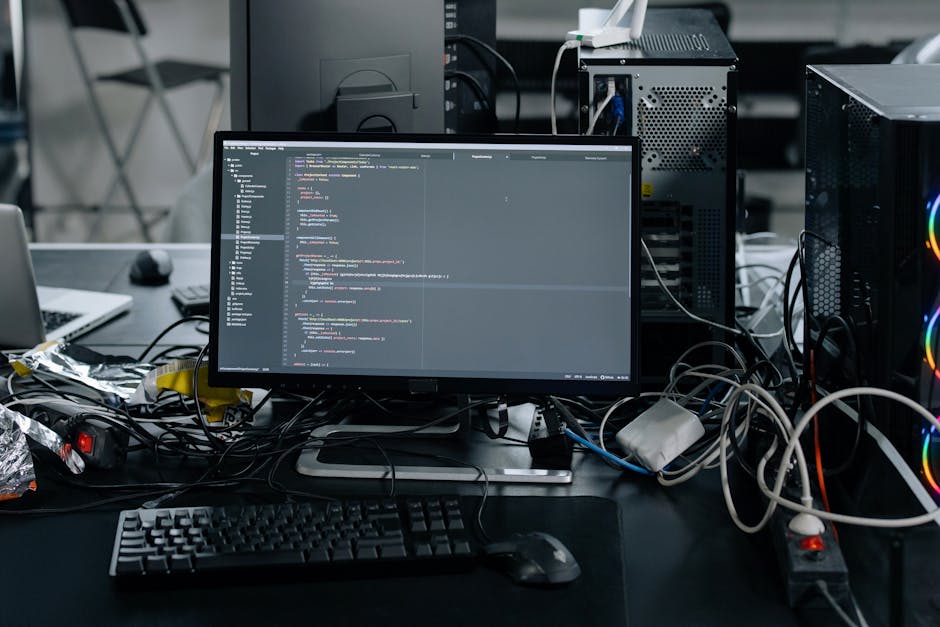Table of Contents
Right, you wanna talk about “Technology & Systems” in 2025. People whisper about it like it’s some magic spell. Most of ’em haven’t got a clue what it actually means, just that it’s going to change everything. Yeah, sure, everything changes, always has. But the real shifts, those are always messy. Never clean, never what the glossy brochures promise. I’ve seen enough of these cycles to know that much. Been staring at headlines for over twenty years now, watching the big ideas get cooked up, then sold, then usually botch it somehow. Or it works, but not for who they said it would.
The biggest racket right now, it’s all about AI. Artificial intelligence, they call it. Like it’s got a brain in there. It’s just fancy math, really. A lot of pattern recognition, spitting out text, making pictures that look almost real. Good enough to fool plenty, I’ll tell ya. The amount of outright nonsense that gets flung out there by these companies, it’s astounding. You got OpenAI, Google DeepMind, Anthropic all jousting for position, throwing billions around like confetti. And for what? So your chatbot can tell you a joke? Or write an email you could have written yourself in half the time? Some of it’s useful, sure, like sifting through mountains of data. But the hype, the sheer volume of it, you’d think we’re on the cusp of Skynet or something. We’re not. We’re just building better, faster tools. Tools that still break.
The Cloud Game, Still Raining Money
Then there’s the whole cloud computing thing. It’s not new, not by a long shot. Been around for ages, really. But it just keeps growing. Everyone wants to stick their stuff up there. Less fuss with your own servers, less staff to pay. Makes sense for plenty of businesses. You’ve got Amazon Web Services, always a behemoth. They practically own the internet infrastructure for half the planet. Microsoft Azure is right there, trying to catch up, and Google Cloud platform, they’re still fighting for scraps at the top table, even with all their fancy AI toys.
Funny thing is, most folks using these services don’t actually understand what’s happening in those giant data centers. They just pay the bill. And the bills, they keep climbing. Someone once asked me, “Is the cloud really more secure?” I just laughed. Secure as anything else, I suppose. Depends on who’s looking after the keys. And who’s trying to pick the locks.
Who’s Picking the Locks?
Speaking of locks, cybersecurity. That’s where the real war is. Always has been. You build something, someone else tries to break it. Simple as that. The number of breaches that never even make it to the news, it’d make your hair stand on end. You got CrowdStrike, Palo Alto Networks, Fortinet. They’re the big dogs, selling their digital fences and guard dogs. Then you’ve got companies like Zscaler trying to make networks safer, and Snyk looking at code before it even gets deployed. Good work, all of it. But it’s a never-ending chase. The bad guys, they don’t sleep. They’re usually a step ahead, or at least a half step. It’s a constant game of whack-a-mole. You patch one hole, three new ones pop up. Some days, I wonder if it’s even worth it. You spend all that money on firewalls, and someone just clicks on a dodgy link in an email. All that fancy tech, undone by one moment of inattention.
The Business of Software: Still Chasing the Unicorn
Software for businesses, that’s another beast entirely. It’s not flashy, not like a new smartphone or some drone that delivers your chips. But it’s the guts of everything. How businesses run their operations. You’ve got SAP and Oracle, been around forever, still selling their giant enterprise systems. Pricey stuff. Salesforce, too, with their customer relationship management. They’re all trying to bolt on AI now, trying to make it sound fresh. Like their old systems needed a brain transplant. Maybe they did.
You see all these young companies popping up, promising to disrupt everything. Most of ’em vanish after a year or two. The ones that stick around, they usually get bought up by the big fish anyway. Or they become the new big fish. The cycle just keeps turning. It’s the same story, different names. remember when everyone was talking about how software would eat the world? Well, it did, and now it’s got indigestion. What’s the deal with all the subscription models? Seems like everyone wants to charge you by the month now. You don’t own anything anymore. You just rent it.
Small Fry Making Waves?
Sometimes a smaller firm will come along and actually do something clever. Not sure who they are right now, but they’re out there. Maybe a small outfit in Cardiff or some bright sparks out of a garage in Newcastle. They build something simple, something that just works for a particular problem. And then the bigger players come sniffing around with their checkbooks. Happens all the time. Or they just rip off the idea and build it into their own system. That’s the tech world for ya. You gotta be quick, and you gotta protect your stuff.
The Chips That Run the World
None of this stuff, not the AI, not the cloud, not even your phone, none of it works without the chips. Semiconductors. That’s the real foundation. You got NVIDIA, they’re basically printing money right now with their graphics processors, powering all that AI. Then there’s TSMC, over in Taiwan, they’re the unsung heroes. They actually make the chips for everyone else. AMD and Intel, they’re battling it out too, always have been. It’s a cutthroat business. And it’s always on the edge. One hiccup in the supply chain, and the whole world screeches to a halt. We saw that during the pandemic. You can’t just magic up a new chip factory overnight. These things take years, decades even. Billions of dollars. It’s a strange thing, this reliance on a few places on the globe for something so utterly vital. It feels a bit… flimsy, doesn’t it?
Automating Everything, Or Trying To
Robots and automation. People think of those mechanical dogs from Boston Dynamics doing backflips, all flashy. But the real story there is in the factories, in the warehouses. Or the software robots that handle all the boring, repetitive tasks in an office. UiPath, for example, they’re big in this Robotic Process Automation thing. Making software do what a human used to do, just faster and without complaint.
My question is always, what about the people? What happens to the bloke on the factory floor when a machine does his job? Or the woman in accounts who used to type up invoices all day? They say, “Oh, they’ll learn new skills.” Sure, some will. But not everyone can become a data scientist or a robot programmer. That’s a romantic notion, often pushed by folks who’ve never had to worry about where their next meal is coming from. It’s a worry, it really is. We’re building systems that are getting smarter, faster, more capable, but we’re not really building a system for the people displaced by all that progress. And that, my friend, is a recipe for trouble down the line. It’s not about making things better for everyone, it’s about making things cheaper for some.
The Money Movers: FinTech’s Ever-Shifting Sands
Payments, that’s another part of this “systems” thing that just keeps chugging along. Financial technology, FinTech they call it. Stripe, Adyen, Block Inc. (that’s the old Square and Cash App crowd). They’ve made it so damn easy to move money around, to take payments. Almost too easy sometimes. Fraud’s always a problem, always will be. You make it simpler, the bad guys find new ways to exploit it. That’s just the way the world works. Everyone wants a piece of the transaction fee. It adds up, you know? A tiny percentage here, a tiny percentage there. But when you’re talking about billions of transactions, that’s real money.
What About Privacy, Then?
People keep asking, “Are we ever going to get real privacy back in this digital age?” My answer is always the same: probably not. Not in the way your grandparents understood it. Every system you use, every app on your phone, every website you visit, it’s all gathering data. About you. What you like, where you go, what you buy. They call it “personalization.” I call it surveillance. These tech companies, they know more about you than your own family sometimes. And they sell it, or they use it to manipulate you into buying more stuff. It’s the engine of the modern internet. You want all these “free” services? That’s the price you pay. Your attention, your information. It’s the bargain we made, whether we understood it or not. And it’s not going away. Nobody’s going to dismantle that gravy train.
AI’s Creative Side: What’s Real Anymore?
So, AI can write articles, make music, even paint. They got programs out there doing it now. What does that mean for the folks who actually create for a living? The artists, the writers, the photographers? Are they just going to be editing what a machine spits out? Or will they be out of a job entirely? I’ve seen some of the stuff these things produce. Some of it’s not bad, a lot of it’s mediocre. But it’s fast. And cheap. And that’s what businesses chase, usually. Speed and cheapness. quality often takes a back seat. And distinguishing what’s human-made from what’s machine-made? That’s gonna get tougher and tougher. We’re already seeing it. It’s a wild west out there. The systems for identifying deepfakes, they’re always playing catch-up.
The Big Picture: Control and Power
Look, at the end of the day, all this “Technology & Systems” stuff, it’s about control. Who controls the platforms? Who controls the data? Who controls the algorithms that decide what you see, what you hear, what you buy? It’s not some abstract academic exercise. It’s real power. And it’s consolidating. You see a handful of giants, like Google, Apple, Meta, Amazon, they pretty much run vast swathes of our digital lives. They build the systems, they set the rules. Government regulations? They try, bless their hearts. But they’re usually years behind, trying to lasso a wild stallion with a piece of string.
What’s the future look like? More of the same, probably. Faster, slicker. More pervasive. More data. Less privacy. Fewer jobs for some, new jobs for others. The gap between the haves and have-nots, the digitally connected and the digitally forgotten, it’ll likely get wider. That’s my prediction anyway. Always has. The tech just makes it more obvious, more extreme. Don’t believe the hype, but don’t ignore the tremors either. Some of these tremors, they’re shaking the very foundations. And that’s something to think about, really think about. No magic solutions coming down the pike. Just more systems, and more people trying to figure out how to live with them. Or around them.












